Regardless of the project’s size or the type of business involved, planning and organizing are crucial elements. People naturally know how crucial it is to manage their tasks and monitor their advancement to stay informed and boost work productivity. Adopting appropriate tools and methodologies is essential for streamlining operations and achieving desired results in today’s fast-paced business environment, where projects are frequently complex and multifaceted. Scrum has become particularly well-liked among these.
Scrum tools are software programs that put the Scrum methodology into practice and give teams a structured way to organize, plan, and track their work. However, selecting the best Scrum tool can be difficult, given the many options available. This article will thoroughly discuss the 10 best Scrum tools, examining their salient characteristics, advantages, and disadvantages. So stay with us so you can decide which tool is best for your project management requirements.
Table of Contents: hide
What Are Scrum Tools?
Scrum tools are software programs created especially to facilitate and improve the use of the Scrum methodology in project management. It is an agile framework that assists teams in effectively managing complex projects by dividing them into smaller, more manageable tasks. These tools offer teams a digital workspace to use Scrum principles to plan, monitor, and collaborate on their work. Teams can also use it to make and organize a backlog, which lists all the project’s tasks and requirements.
Sprints, which are time-boxed iterations of work, can be planned and organized with the help of Scrum tools. Teams can choose the tasks to be included in each sprint and specify their length. Thanks to the tools, teams can see the progress and estimate the work needed for each task. In addition, these tools allow teams to monitor the status of tasks throughout a sprint. Team members can update the status of their assigned tasks, mark them as finished, or report any problems or difficulties they encounter. As a result, there is increased team visibility and transparency.
Top 10 Scrum Tools for Project Management
Are you trying to find the best tool for Scrum? Your search is over right here! We have compiled a thorough list of the top 10 Scrum tools in this section. Important details like key features, pricing, and user experiences are included in this list. We know how important it is to locate a tool that satisfies your team’s and your project management needs. Because of this, we carefully considered and chose these top Scrum tools. Let us get started so we can give you some useful information!
Wrike
The project management software provider Wrike provides the Scrum tool known as Wrike Scrum. In 2006, Andrew Filev founded it. Wrike Scrum is built to help teams implement the Scrum methodology and streamline their project management procedures. Teams from various industries use it to organize, plan, and track their work according to the Scrum principles. Besides this, team members can communicate, collaborate, and stay on top of their tasks and deadlines on this tool’s centralized and collaborative platform.
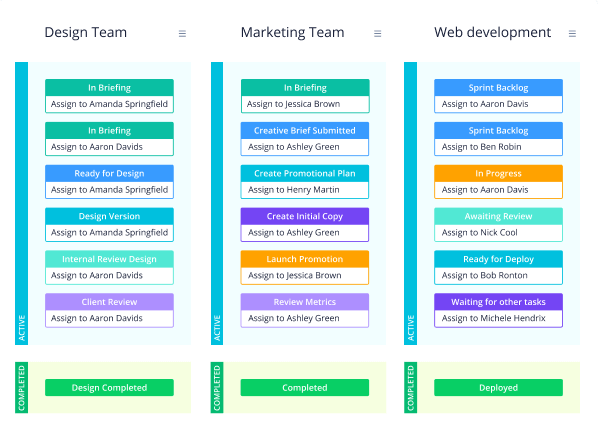
Scrum Tools – Wrike
Wrike’s Key Features
- Ability to customize the dashboard.
- Generates analytical reports.
- Provides integration capabilities
- Available on mobile devices.
Customer Ratings
- Capterra: 4.3/5 (2414 reviews)
- G2: 4.2/5 (3420 reviews)
Wrikes’s Price Plans
- Free to use.
- Team for $9.80 /month.
- Business for $24.80/month.
- Enterprise and Pinnacle Plan.
Monday.com
A Scrum tool is available as part of the platform from Monday.com, a project management software provider. Monday.com, which Roy Mann and Eran Zinman founded in 2012, has become well-known for its elegant user interface and adaptable features. It facilitates effective teamwork, simplifies Scrum implementation, and gives teams the resources to successfully organize, monitor, and complete projects. Organizations from various industries use the tool to improve their project management outcomes by streamlining their workflows.
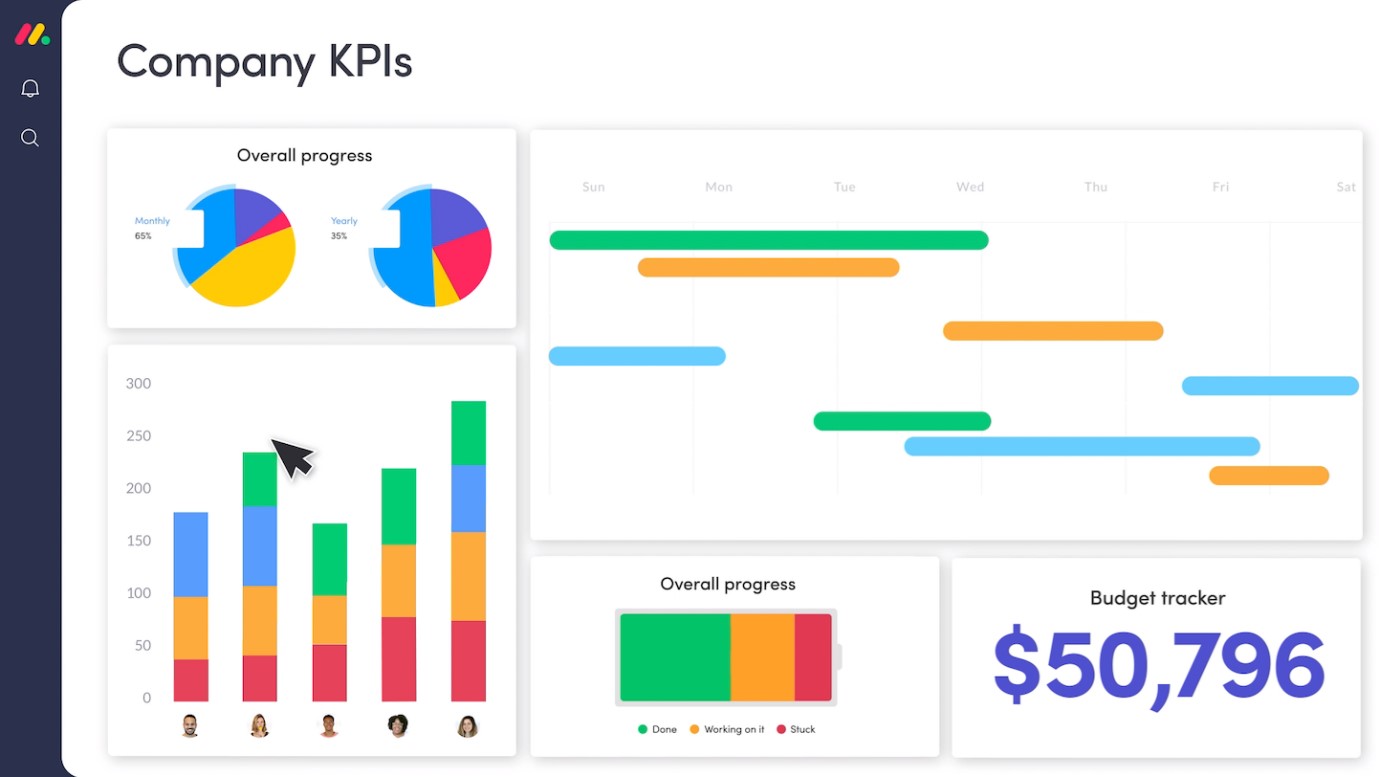
Scrum Tools – Monday.com
Monday.com’s Key Features
- Pulses for task progress in the format of a spreadsheet
- Easy integration.
- Provides intuitive Agile board.
- Offers tools flexibility
Customer Ratings
- Capterra: 4.6/5 (3928 reviews)
- G2: 4.7/5 (8091 reviews)
Monday.com’s Price Plans
- Free
- Basic for $6/seat/month.
- Standard for $10/seat/month.
- Pro for $16/seat/month.
- Offers Enterprise plans.
ClickUp
ClickUp, a platform for project management and collaboration, provides Scrum capabilities. Zeb Evans founded ClickUp in 2017, and since then, it has grown in popularity thanks to its many features and simple interface. Teams from various industries use it to implement and manage Scrum methodologies effectively. It offers a centralized platform where teams can use Scrum principles to plan, arrange, and track their projects. The tool encourages teamwork, open communication, and flexibility. Users value ClickUp’s adaptability because it allows them to customize the tool.
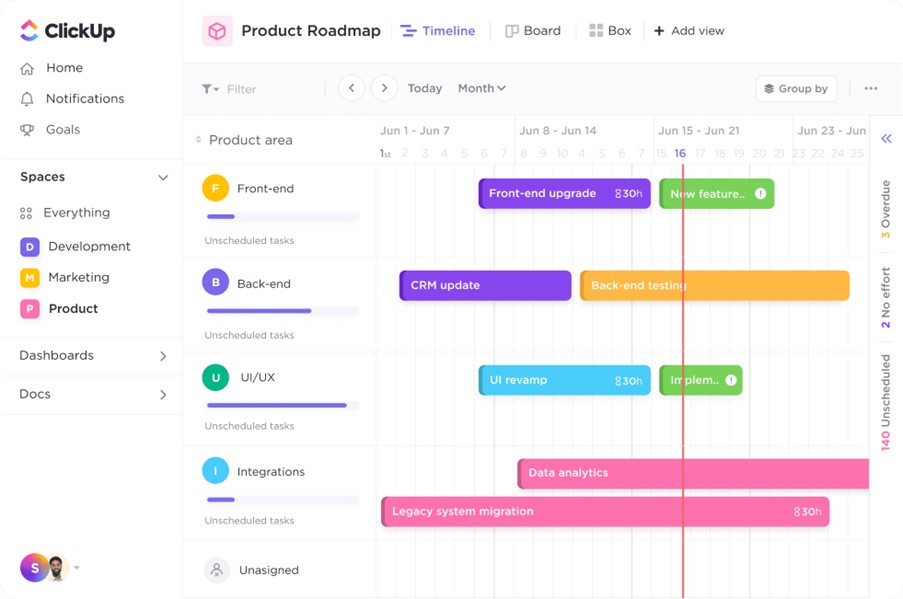
Scrum Tools – ClickUp
ClickUp’s Key Features
- Allows automation of repetitive tasks.
- Offers reporting and analytics.
- Innate time tracker.
- Customizable agile boards.
Customer Ratings
- Capterra: 4.7/5 (3676 reviews)
- G2: 4.7/5 (6954 reviews)
ClickUp’s Price Plans
- Free
- Unlimited for $5/member/month.
- Business for $12/member/month.
- Business Plus for $19/member/month.
- Offers Enterprise plans.
Zoho Sprints
Zoho Corporation, a software company established in 1996 by Sridhar Vembu and Tony Thomas, created Zoho Sprints as a Scrum tool. The tool aids teams in adopting Agile principles, increasing productivity, and producing high-quality goods or services. Teams from various industries use it to enhance collaboration and streamline project alignment procedures. Its centralized platform enables teams to manage their backlog, schedule sprints, keep track of tasks, and track project progress.
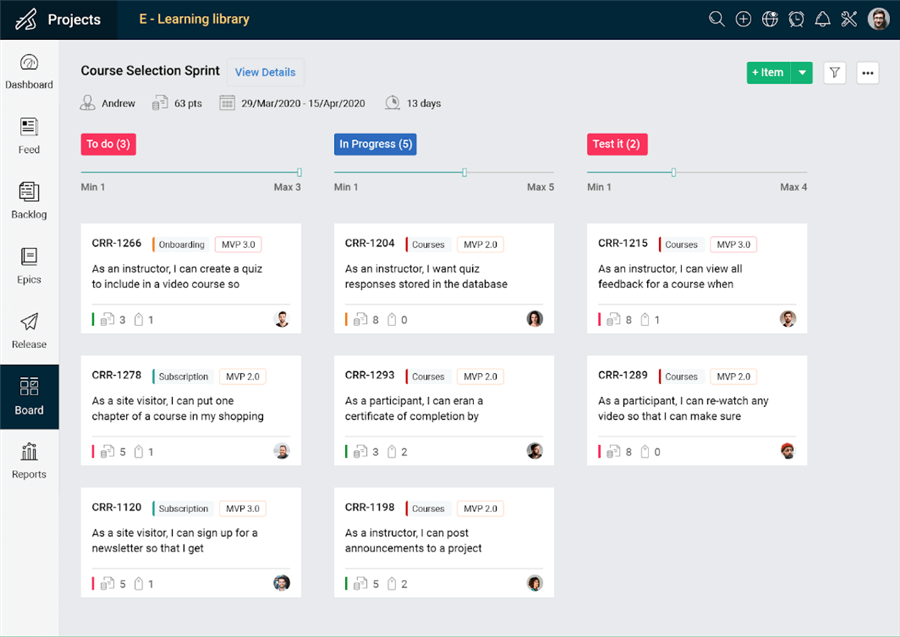
Scrum Tools – Zoho Sprints
Zoho Sprints Key Features
- Integrates with popular tools.
- Different analytical charts like velocity graphs.
- Drag-and-drop stories.
- Create custom status.
Customer Ratings
- Capterra: 4.5/5 (222 reviews)
- G2: 4.5/5 (149 reviews)
Zoho Sprints Price Plans
- Free trial
- Starter for $1/user/month.
- Elite for $2.50/user/month.
- Premier for $4/user/month
Jira
Atlassian created Jira, a Scrum tool that is well-known and admired. In 2002, Scott Farquhar and Mike Cannon-Brookes founded it. Teams from various industries use Jira to manage and track their projects according to Scrum methodologies efficiently. It offers a complete platform where teams can arrange their work, manage user stories, schedule sprints, and monitor task progress. It is widely used in fields like software development, IT, engineering, and project-based businesses. Due to its adaptability, it can be used by teams of any size, from small startups to huge corporations.
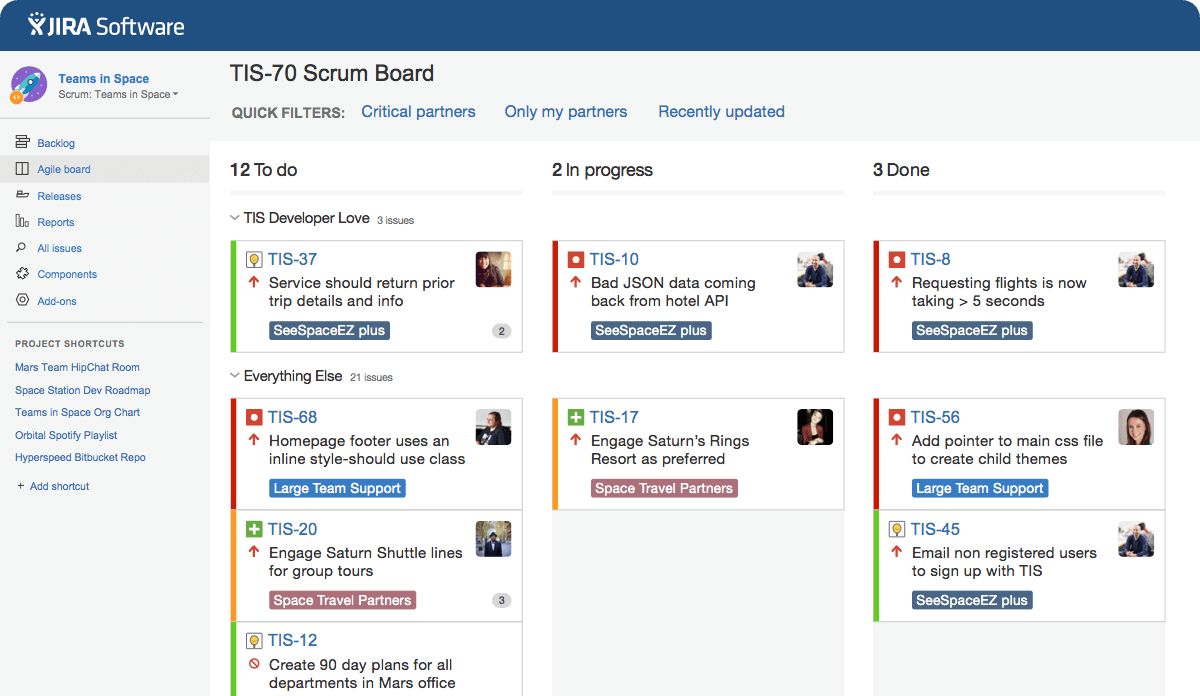
Scrum Tools – Jira
Jira’s Key Features
- Combined user stories view.
- Offer numerous plugins.
- Provides version control integration.
- Roadmapping features.
Customer Ratings
- Capterra: 4.4/5 (13,239 reviews)
- G2: 4.3/5 (5296 reviews)
Jira’s Price Plans
- Free
- Standard Plan for $7.75/user/month.
- Premium Plan for $15.25/user/month.
- Offers Enterprise plans.
VivifyScrum
A web-based Scrum tool, VivifyScrum, was created to help Agile teams manage their projects effectively. It offers several features designed specifically for Scrum methodologies. Vladimir Kostic and Bojan Spasic founded VivifyScrum. Teams of all sizes, including both small and large corporations, use it. It serves a variety of sectors and industries that use Scrum, including software development, IT, marketing, and project management. Any team or organization looking to implement Scrum principles and enhance project management procedures can use the tool.
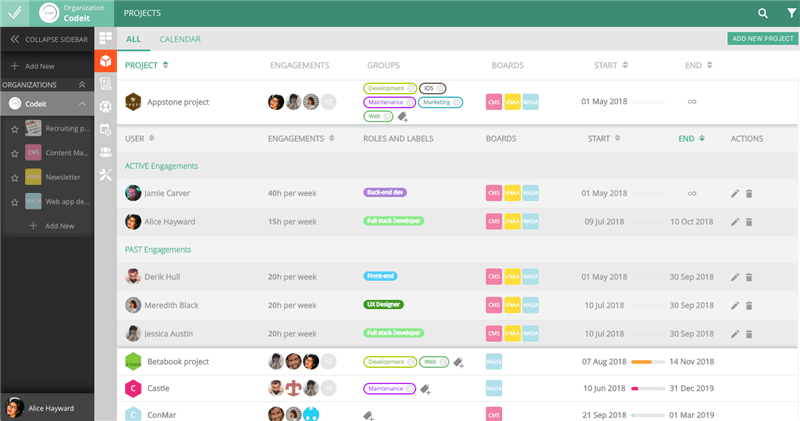
Scrum Tools – VivifyScrum
VivifyScrum’s Key Features
- Intuitive interface.
- Offer backlog management.
- Provides visual boards.
- Easy integration.
Customer Ratings
- Capterra: 4.4/5 (127 reviews)
- G2: 4.8/5 (12 reviews)
VivifyScrum’s Price Plans
- Free trial.
- Starter Plan for $10/month
- Standard Plan for $6/user/month
- Growth Plan for $5/user/month
- Offers Enterprise plans.
TargetProcess
A well-known Agile project management tool, TargetProcess, supports Scrum and other Agile methodologies. Michael Dubakov started it in 2004. It aims to give teams a thorough platform to plan, track, and manage their projects effectively. It is well-liked and has grown in recognition within the Agile community. Its value is based on the particular requirements and preferences of the team or organization using it. The tool has a comprehensive feature set built to support Agile methods and foster teamwork.
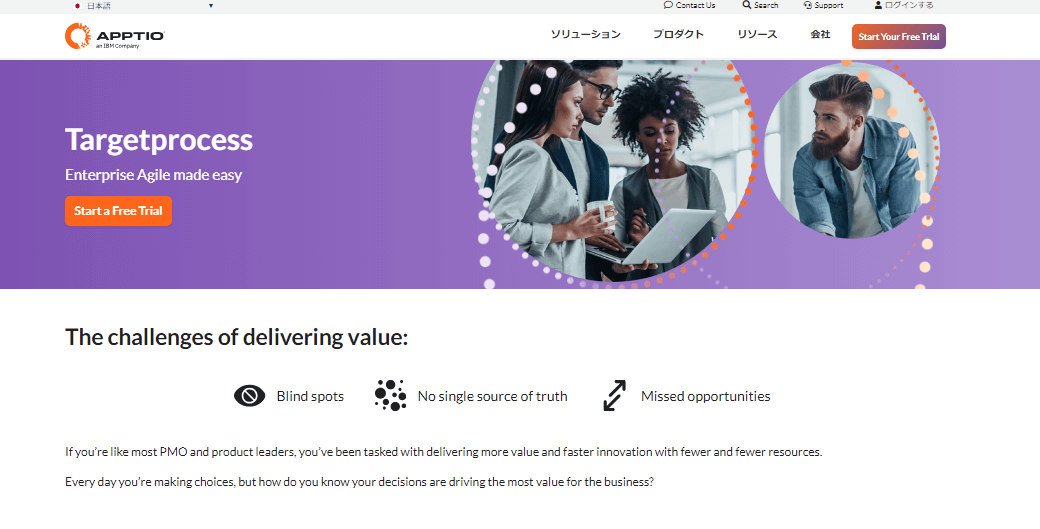
Scrum Tools – TargetProcess
TargetProcess’s Key Features
- Customizable Scrum boards.
- Visual reports to identify bottlenecks.
- Integration capabilities.
- Offer mobile supportability.
Customer Ratings
- Capterra: 4.5/5 (542 reviews)
- G2: 4.3/5 (194 reviews)
TargetProcess’s Price Plans
- Contact and get a quote.
Yodiz
Yodiz is a web-based Scrum and Agile project management tool that supports team planning, tracking, and collaboration. Mehmet Duran and Canberk Akduygu founded it in 2010. Yodiz seeks to offer a complete platform that aids in effective project management and supports Agile methodologies. The adaptability and scalability of Yodiz are some of its noteworthy features. It has options for customization, enabling teams to fit the tool to their unique terminology and workflows. Businesses of all sizes and from a range of industries use it to support Agile practices.
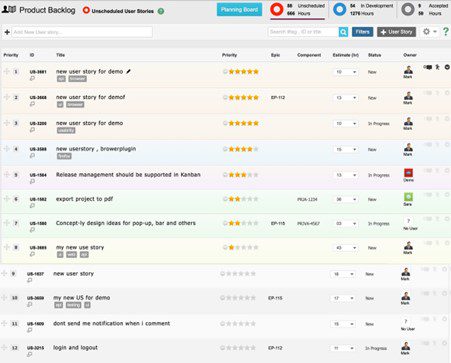
Scrum Tools – Yodiz
Yodiz’s Key Features
- Offers release planning capabilities.
- Provide test case management component.
- Offers feedback management.
- Easily customizable
Customer Ratings
- Capterra: 4.5/5 (5 reviews)
- G2: 4.4/5 (22 reviews)
Yodiz’s Price Plans
- Free
- Agile Tool for $5/month
Axosoft
Axosoft is a software development tool emphasizing Scrum and other Agile methodologies. Hamid Shojaee founded it in 2002 to address his difficulties in managing software development projects. Since then, it has developed into a popular tool among Agile practitioners. It is a potent and feature-rich project management tool with various functionalities tailored for Agile teams. It offers comprehensive support for Scrum procedures, including backlog management, sprint planning, task tracking, burndown charts, and team collaboration.
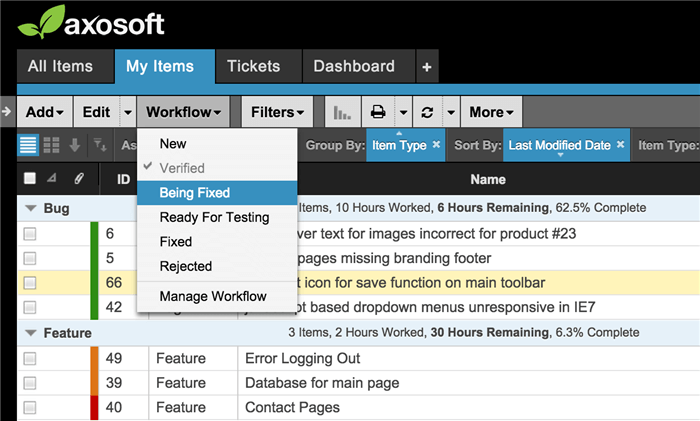
Scrum Tools – Axosoft
Axosoft’s Key Features
- Offers a dedicated release planner.
- Built-in customer support.
- Allows repetitive tasks to be automated.
- Time tracking and estimation
- Offers to host.
Customer Ratings
- Capterra: 4.2/5 (40 reviews)
- G2: 4.9/5 (40 reviews)
Axosoft’s Price Plans
- Set parameters to calculate the cost.
ActiveCollab
A scrum management and collaboration tool called ActiveCollab aids teams in streamlining their processes and increase productivity. Ilija Studen and his group founded it in 2007. The tool was developed to address the founders’ difficulties in project management and offer a remedy that encourages effective teamwork and communication. It is well regarded for its ease of use, friendly user interface, and extensive feature set that meets project management requirements. ActiveCollab has grown in popularity and is now used by many teams and organizations.
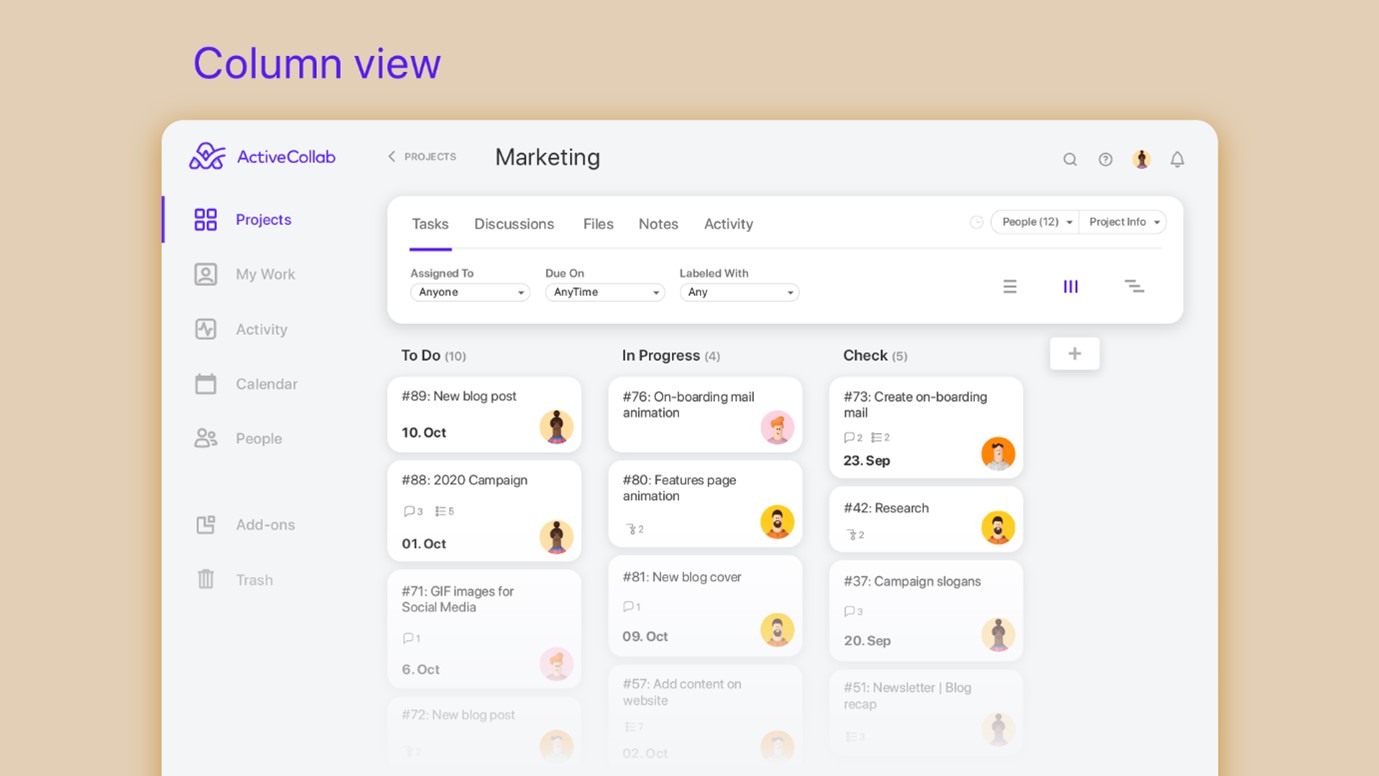
Scrum Tools – ActiveCollab
ActiveCollab’s Key Features
- Offers Kanban board view.
- Includes interactive Gantt charts
- Keeps record of time and budget spent.
- Provides built-in invoice features.
Customer Ratings
- Capterra: 4.5/5 (394 reviews)
- G2: 4.2/5 (88 reviews)
ActiveCollab’s Price Plans
- Free trial.
- Plus Plan for $11/3 users/month.
- Pro Plan for $9/user/month.
- Pro + Get Paid Plan for $14/user/month.
What Is the Best Practice for Scrum?
Best practices must be adhered to in any project or organizational endeavor. It ensures teams function well, generate excellent work, and achieve their goals. To enhance their performance, teams should consider implementing several Scrum best practices. The knowledge and experience that successful Scrum teams have amassed are the foundation for these procedures. Teams that use these techniques can handle project complexity more deftly, lower risks, and satisfy stakeholders.
The best practice that every organization following Scrum should follow is sprint retrospective. A specific Sprint Retrospective meeting is held in the Scrum framework after each Sprint. It allows the Scrum Team to evaluate the most recent Sprint and pinpoint areas where their procedures, teamwork, and overall performance could be strengthened. The team engages in candid discussions to assess their accomplishments, celebrate victories, and acknowledge challenges encountered during the sprint retrospective.
Final Thought
All in all, various tools on the market meet many needs and preferences. Given the abundance of options available, selecting the ideal tool can be strenuous. To assist you in making a wise choice, we have compiled a thorough list of the 10 best Scrum tools, emphasizing their key features and pricing structure. If this has been helpful to you, do not forget to share it with your friends and family, and leave us feedback in the comments section below.



